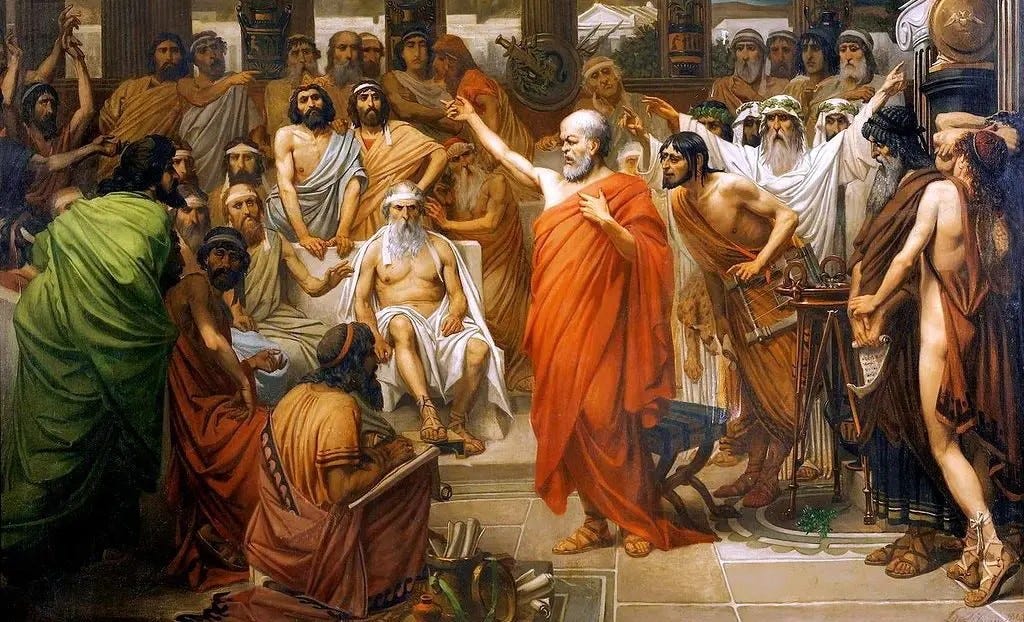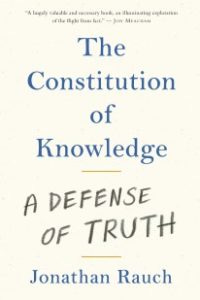To Conquer Our Biases and Improve Our Knowledge, We Need Epistemic Liberalism
Jonathan Rauch’s ‘The Constitution of Knowledge’ argues in favor of liberal principles that society can hold in common despite significant differences

Human biases are widespread and usually troublesome. Confirmation bias, for example, leads us to seek evidence and ideas that confirm our pre-existing views. We choose to interpret information to align with our strongly held opinions or beliefs. We are also strongly inclined toward conformity bias: Due to our innate desire to belong, we’re motivated to emulate or mimic behaviors that enable us to feel we’re part of a group. The combination of these two biases generates another phenomenon, epistemic tribalism, which is currently plaguing our liberal democracy.
Epistemic tribalism means we tend to think with our tribes. We look to our community’s traditions, practices and beliefs, and we follow them. This became an important and, in fact, necessary feature of our evolution, because we trusted that our ancestors were right about the things they had spent a long time trying to understand, and now we didn’t have to. In his book “The Constitution of Knowledge: A Defense of Truth,” journalist and public intellectual Jonathan Rauch explains that “our beliefs, our reasoning, even our perceptions are contagious, often regardless of whether our beliefs, reasoning, and perceptions are steering us toward truth or error. Cognition is influenced not only by our own biases but also by the biases of others we identify with.” Essentially, there’s a way in which we perceive the world together that is not always obvious, but very subtle. Epistemic tribalism partly explains why we enjoy associating with certain communities, forming our own echo chambers and belonging to groups where our ideas are validated rather than challenged.
If we’re prone to epistemic tribalism and we think with our tribe, how do we deal with the people who aren’t part of that tribe? Can we, regardless of the epistemic tribes we belong to, agree on some basic facts and ideas that would help develop some common knowledge about our world? To address this challenge, Rauch looks at the breakthrough periods in the 17th and 18th centuries when three liberal orders emerged: economic, political and epistemic liberalism. These liberal orders present a way for us to find common ground despite our differences, a benefit that is sorely needed in American society today.
Three Types of Liberalism
According to Rauch, the principles that inform the American economic system had a founding document in the form of “The Wealth of Nations” (which is connected to another important treatise on moral development, “The Theory of Moral Sentiments”), authored by Adam Smith. Economic liberalism fosters market cooperation, which can lead to prosperity. One of Smith’s core insights, in Rauch’s view, is that “if we get the rules right, millions of people of every imaginable skill and temperament and nationality can cooperate to build a fantastically complex device like a Prius or iPhone, all without oversight or instruction of any central planner.” Basically, if you give people the freedom to “truck, barter, and exchange,” they will cooperate to unleash the forces of economic prosperity.
Political liberalism deals with another aspect of cooperation—how to make rules that allow people of different backgrounds, interests and motivations to govern themselves peacefully. The Declaration of Independence and the U.S. Constitution emerged from thinking around political liberalism that was based on an emancipatory ideal from the Enlightenment period: We’re born free, and we ought to treat one another as dignified equals. Thinkers like John Locke observed that for a society to govern itself effectively, concepts such as freedom, equality and toleration were important to sustain a polity made of people from different backgrounds and beliefs.
Finally, epistemic liberalism seeks to address the question of whether people with very different perspectives, beliefs and lenses for perceiving the world can cooperate in building knowledge without recourse to authoritarianism. Rauch maintains that this challenge requires a constitution, but not necessarily a written document; rather, it can be a set of social rules that are unwritten. These rules emerged in the U.S. from liberal principles as applied to empirical science: an approach for knowledge-seeking that allows individuals and groups to challenge and contest ideas freely. Epistemic liberalism fosters a grand social network with different nodes, communities and interactions. Rauch calls this network the constitution of knowledge, a “social operating system which seeks to elicit cooperation and resolve differences on the basis of rules, not personal authority or tribal affiliation or brute force.”
Reality and Its Challengers
Hence, we may not all agree on everything, but we can agree on the processes and rules that guide the way we investigate a matter: how we verify sources, perform experiments and make deductions based on certain evidence. To use Rauch’s term, a “reality-based community” emerges to uphold the constitution of knowledge as the community follows these principles and abides by these processes to obtain knowledge. The community understands that we cannot have perfect certitude, because we’re fallible and no one has the final word on a matter, but we can constantly improve and update our knowledge with new information over time. We must gain knowledge of the world together, connecting various dots identified by experts and explorers. This is how knowledge in science, law and other realms has accumulated. And such knowledge is based on epistemic liberalism, which creates the openness for us to exchange ideas and challenge orthodoxies. The reality-based community includes various institutions: academia, science, law, journalism and government, to name a few.
Rauch contends that one of the biggest challenges of our time is the attack on the reality-based community coming from populists and radicals from all sides of the political spectrum. Similar to the way the printing press revolutionized the public square, including transmitting information about alternative religious views, the internet and the emergence of computer devices have transformed the public sphere in the 21st century. Both accurate and false information are transmitted very quickly in this new era. It turns out that falsehoods online are diffused further, faster, deeper and more broadly than truth or accurate information.
This environment, which at times seems to be fueled by outrage, favors actors who are more skilled at capturing attention or who exploit it for their own political aims. It is an environment where fake news spreads widely and where trolling (being purposefully outrageous to provoke those one disagrees with) and canceling (employing tactics to coerce or limit speech and expression) thrive. These are challenges to epistemic liberalism, and they have a chilling effect on civil discourse and open inquiry.
We see this chilling effect on college campuses where students are self-censoring (as we see in a recent survey produced by the Foundation for Individual Rights in Education in partnership with RealClearEducation and College Pulse). Further, these tactics are enhancing preference falsification, the “act of misrepresenting one’s wants under perceived social pressures.” This phenomenon was articulated by Timur Kuran in his 1997 book “Private Truths, Public Lies: The Social Consequences of Preference Falsification.” Tactics to silence, pressure and prevent individuals from expressing ideas and beliefs push us back into epistemic tribalism and away from epistemic liberalism, which fosters the habits of raising questions, speaking up and contesting predominant ideas.
Skepticism, Truth and Courage
Rauch masterfully demonstrates the scaffolding of principles and ideas, rooted in liberal democracy, that historically emerged to form a knowledge-based society. However, while he addresses its problems, his view of the “reality-based community” that helps to sustain the constitution of knowledge is at times too hopeful and generous. This community, comprising professionals across journalism, academia, government agencies and the like, is often susceptible to groupthink in a way that generates a lack of trust among society more broadly.
In his book “The Revolt of the Public and the Crisis of Authority in the New Millennium,” Martin Gurri explains that the internet has exposed volumes of information to the public and resulted in a diminished regard for the “reality-based community,” which most describe as elites in various institutions. The decline in trust emerged from decades of errors, miscalculations and scandals, from post-9/11 military responses to misperceptions around the financial crisis of 2008 and current efforts to address the COVID-19 pandemic. The lack of trust in the current reality-based community—especially when this community reflects a consensus dominant view that is sometimes inaccurate or does not align with reality—generates alternative-reality-based communities with different rules, based largely on incomplete information, some intuition and a heavy dose of speculation and conjecture. In other words, we are back to epistemic tribalism.
Ultimately, “The Constitution of Knowledge” is uplifting, particularly for the solutions that it outlines: We need to build and strengthen institutions that preserve epistemic liberalism. We need to diversify the academy so that multiple viewpoints are represented. We need to stand up to cancelers and trolls. We need to develop the civil society groups that will support an environment that tolerates multiple viewpoints but also adheres to the rules of scientific inquiry. In my conversation with Rauch about the book, he said:
At the end of the day, none of that works if individuals don’t say, “I care about truth. I am not going to lie about someone in order to take them down. I am not going to join a cancel campaign. In fact, if someone I know, or someone in my academic community or my social world, is being attacked for having the wrong opinion and threatened not just with correction, like, ‘You’re wrong and here’s why,’ but ‘No, you deserve to lose your job’—even if I disagree with that person, I should step forward and say, ‘What you cancelers are doing to this person is wrong. This is bullying. This is propaganda.’” . . .
Individuals are the starting point of drawing the line and saying, “I know what you’re up to. It’s not going to work; you can’t demoralize me. I am speaking out, and I don’t care if you call me a homophobe or a bigot or whatever. I’m going to stand my ground.” That takes guts, that takes courage, and these people need support. You can’t do it by yourself. But yes, it has to start with individuals arming themselves against these kinds of epistemic attacks. Indeed, in a society that distrusts or outright rejects the authority of traditional institutions, we all need a little dose of courage to work toward preserving epistemic liberalism and the freedom of thought that broadens knowledge and improves our understanding of the world.




